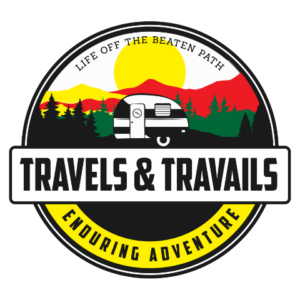Every year I make a resolution to eat healthier, and every year I fail. And it’s even more challenging to eat healthily when camping or traveling to a camping destination. If you’re like me, you’re probably wondering how to eat healthy while RV camping.
You can eat healthier while camping if you plan ahead, pack a cooler with healthy food, cook your own meals, buy local produce, stay hydrated, opt for whole foods, mind your portions, plan for dinners out, bring healthy condiments, and be flexible.
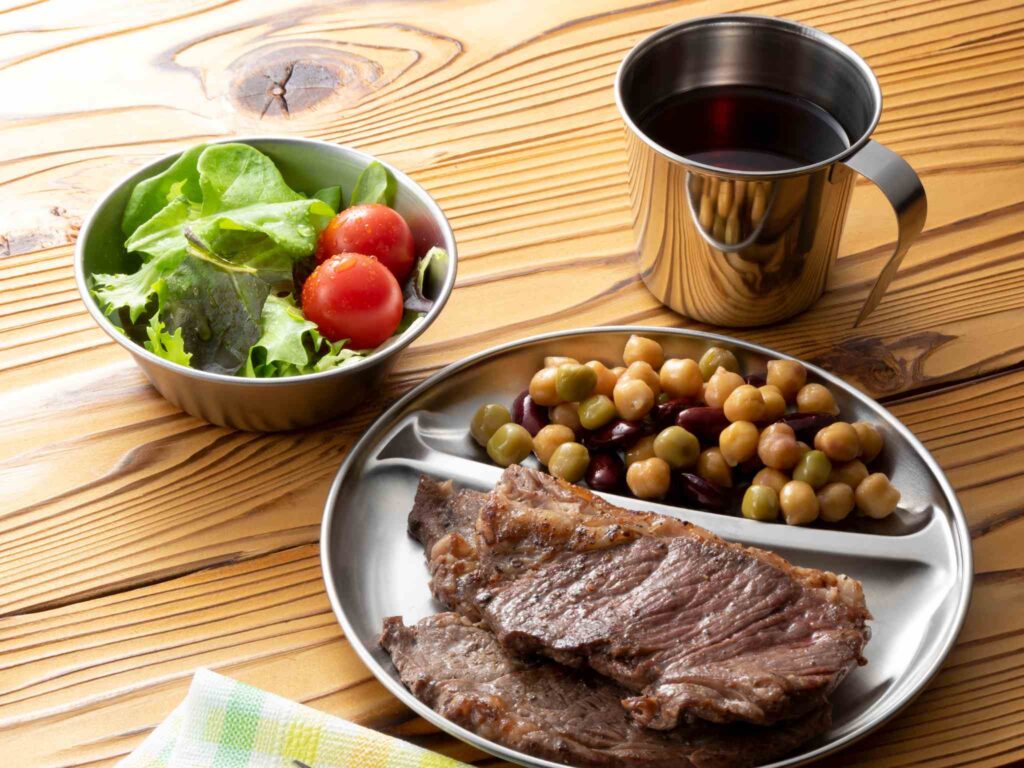
Plan Camping Meals Ahead
Make a meal plan for your trip. I can say that this is one thing that I am good at. I always make a meal plan and make a grocery list. I buy enough groceries for a week or so since that’s what we have room for. We have a tiny freezer, so I either have to plan for fewer meals or plan to make more meals from shelf-stable foods.
Do we stick to our plan? Not always. We generally eat most of the planned meals, but not always in the order, I anticipate. That’s Okay; if you’re meal planning, consider giving priority to meals that have perishable ingredients.
If we’re on a more extended trip, I generally try to make a meal plan for the whole trip or at least a large portion. We went on a 5-week trip, and I planned meals out for about three weeks. After that, I still planned ahead and went grocery shopping during the trip.
I really like to make meals ahead. I don’t like to cook, so that’s not what I want to do when we are on a fun trip. I met a woman at a camper rally who pre-made her meals and put them in gallon-sized ziplock bags. When she opened her freezer, the bags were stacked up, one on top of the other. This gave her a considerable number of meals in a compact space.
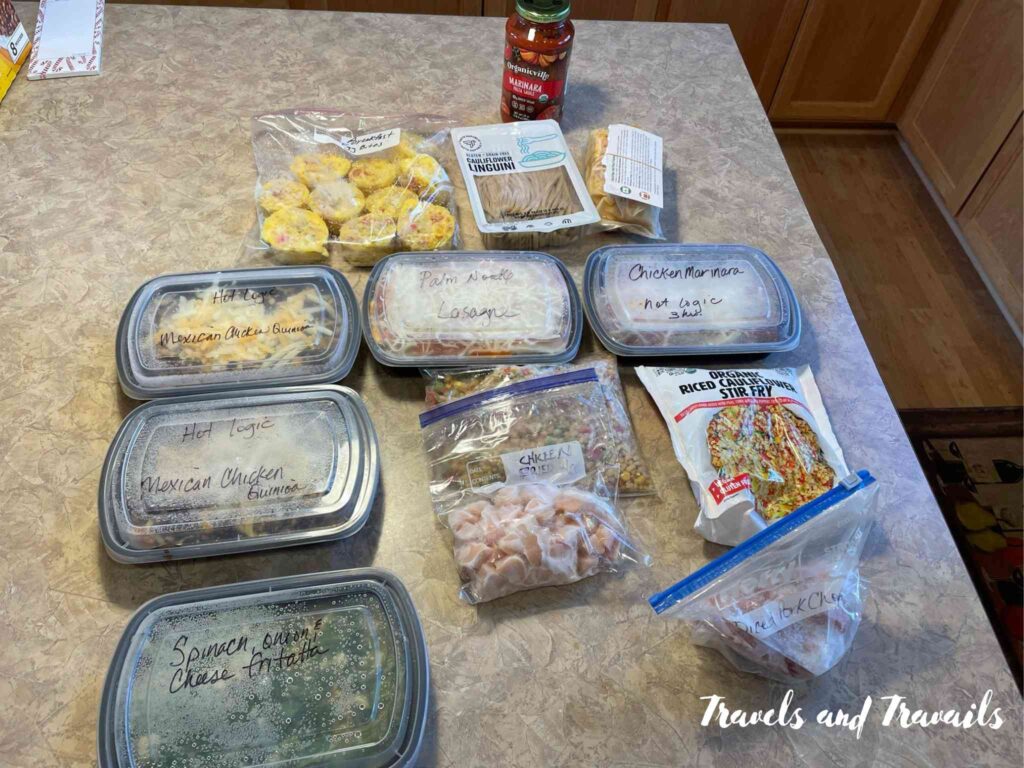
We have a Hot Logic Mini. I love it because I can make meals ahead, put them in a container in the freezer, then warm them for lunch or dinner when we get to camp. It does take a couple of hours to warm a frozen meal, so you have to plan ahead. If you’d like to know some of my other cooking methods, read this article.
Bring healthy snacks like fruit, vegetables, nuts, and granola bars. This will help you avoid impulse buying unhealthy snacks on the road. This trips us up every time. When meal planning, I always forget about snacks. That’s mainly because I don’t snack that much. However, my husband is a snacker. When we stop for gas, he’ll often buy candy or chips. Then he buys some for me too. That’s a diet killer if ever there was one. When you make your meal plan, ensure a section for snacks.
Pack a Cooler for Your Camping Trip
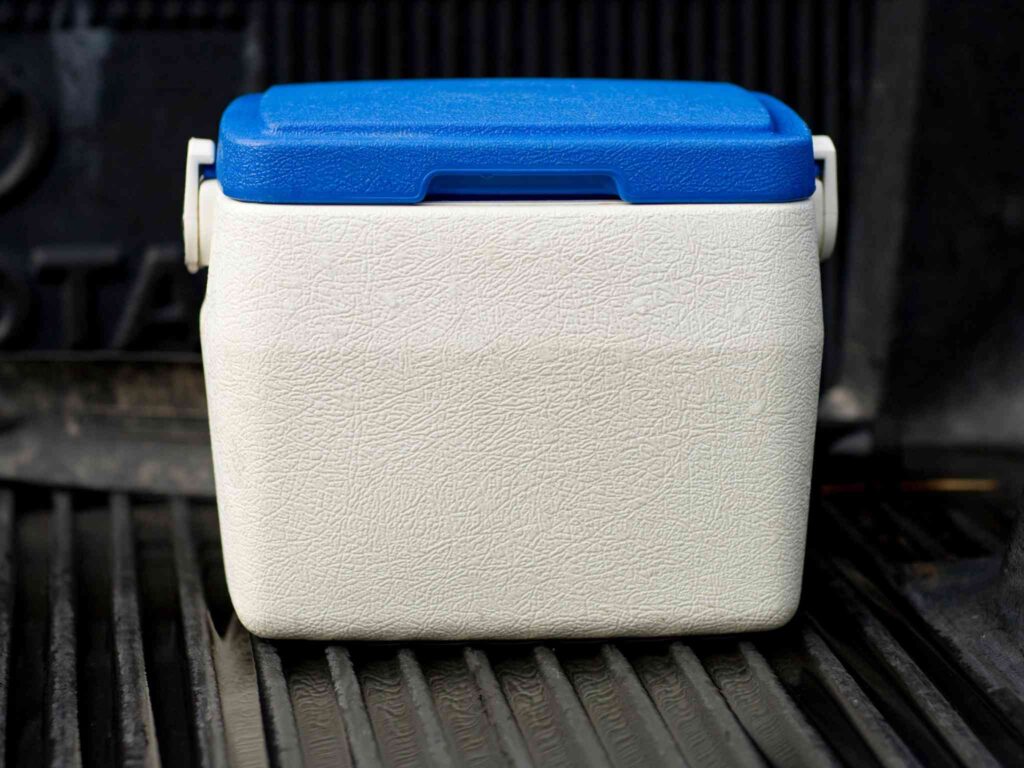
Bring a cooler and fill it with healthy foods like yogurt, hard-boiled eggs, hummus, cut-up veggies, and fruit. We are much more likely to eat more nutritious food when we have a cooler with healthy snacks in the truck.
I’m not a big fan of hummus, but my husband loves it. Hummus and veggies are good snacks to keep him going while we are driving to our destination. He also likes nuts. Almonds make a healthy snack, and they are easy to eat in the car.
Bars aren’t always the most nutritious type of snack. However, my husband found these Perfect Keto Bars that he really likes. They come in a bunch of flavors and only have three grams of carbohydrates.
Cook Your Own Camping Meals
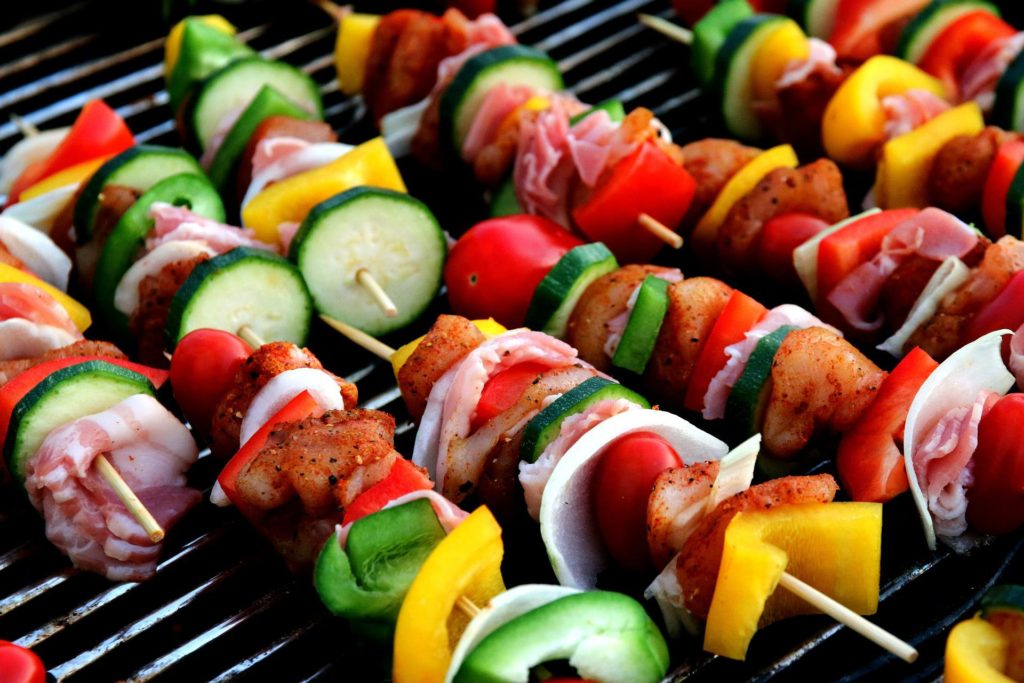
RVs usually have a small kitchenette so that you can prepare your own meals with healthy ingredients.
Cooking your own meals while RV camping can be a great way to eat healthily and save money. By cooking your own meals, you have control over the ingredients and can ensure that your meals are nutritious and balanced. You can also customize your meals to suit your tastes and dietary needs.
Eating out costs big money. My husband and I went to Jack In The Box recently and for the two of us, the price was a little over $30! I could make three nice meals for us for $30. Plus, eating out is not always the healthiest option. If you’re looking for ways to save money on food while camping, read this article.
If you plan your meals and then cook them, you’ll be on track to eating a healthier diet on the road. It’s important to plan ahead and make sure you have all the necessary cooking supplies and equipment, as RV kitchens can be small and limited in terms of appliances and storage space. If you’re not sure what you need for your RV kitchen, here’s an article that I wrote.
Use Local Produce from Your Camping Destinations
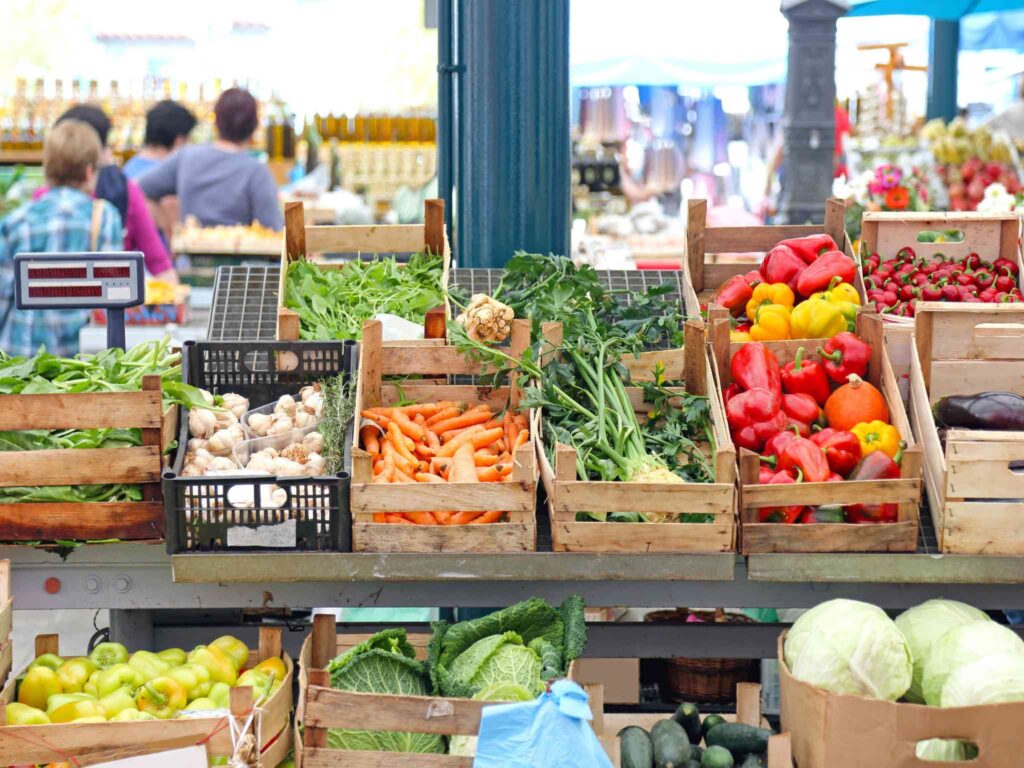
Check out farmer’s markets and local grocery stores for fresh, healthy produce. This is a great way to support local businesses and find unique foods you might not find at home. Plus, an outing to the local farmers market can be a fun way to discover the area’s culture.
Using local produce can also be an enjoyable way to incorporate regional flavors into your meals. For example, if you’re traveling through the Southwest, you might try incorporating chili peppers or cactus fruit into your dishes. Or, if you’re in the Pacific Northwest, you might try incorporating fresh salmon or berries into your meals.
Local produce is often fresher and more flavorful, as it doesn’t need to travel as far to reach your plate. It’s also likely to be more environmentally sustainable, requiring less transportation and packaging.
Stay Hydrated on Your Camping Journey
Be sure to drink enough water during your RV trip. I’m sure you’ve been beaten over the head with this, but it’s a good point.
Drinking enough water is crucial for staying healthy while RV camping. It’s important to stay hydrated, especially when you’re spending time outdoors and potentially exposed to hot weather or high altitudes.
We were on a trip to Escalante Grand Staircase, and I wanted to go on a hike. My husband stayed back at the trailhead because we didn’t want to take our dog into slot canyons.
The sign at the trailhead said to bring a gallon of water. I thought that was ridiculous. A gallon of water weighs eight pounds – no way I would carry that for a short hike.
Long story short, I got lost. Fortunately for me, I had my husband’s day pack instead of my own. His pack was full of water, and mine was not. Before I found my way out and got back to the start of the trail, my water was GONE – all gone. Needless to say, I made it back, or you wouldn’t be reading this.
Dehydration can cause a range of symptoms, including headaches, fatigue, dizziness, and muscle cramps. In severe cases, it can lead to heat exhaustion or heat stroke, which can be dangerous or even life-threatening.
To make sure you’re drinking enough water during your RV trip, it’s a good idea to bring along a refillable water bottle and make it a habit to drink water regularly throughout the day. If you’re not a fan of plain water, try adding some fresh fruit or herbs for flavor, or drink herbal tea or coconut water for variety.

It’s also important to be aware of the signs of dehydration, such as thirst, dry mouth, dark urine, or feeling tired or dizzy. If you experience any of these symptoms, drink more water and take a break from a physical activity if possible. If you’re traveling with others, encourage them to drink enough water as well and make it a priority to stay hydrated.
Opt for Whole Foods on Your Camping Trip
Choose whole foods over processed foods when possible. This means choosing fresh fruits and vegetables, whole grains, lean proteins, and healthy fats. Avoid sugary drinks, chips, and candy.
I am eating whole foods while RV camping can have several benefits for your health. Whole foods are typically more nutrient-dense than processed foods.
When you’re making your meal plan, search for recipes that incorporate whole foods. There are many recipes on the web. Search for clean eating or healthy eating or entire food recipes.
While food diets are typically higher in fiber, which can help keep you feeling full and satisfied and support healthy digestion.
When choosing whole foods while RV camping, aim to incorporate a variety of colorful fruits and vegetables, whole grains like quinoa or brown rice, lean proteins like chicken or fish, and healthy fats like avocado or nuts. Don’t get sucked into eating processed foods like chips, candy, or sugary drinks, as these are high in calories and low in nutrients.
Mind Your Portions When Eating Meals at Camp
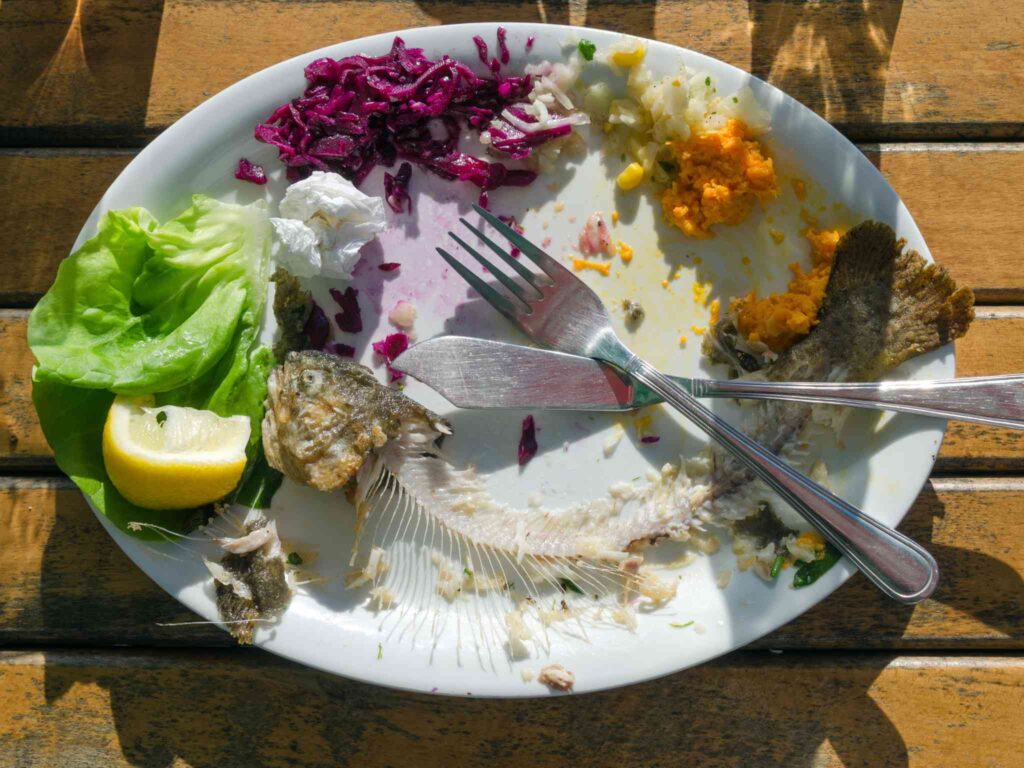
RV camping can be a time for indulgence, but try to practice portion control. Eat until you are satisfied, not stuffed. Lately, I have struggled with this. I recently noticed that, if I don’t eat everything on my plate, my husband makes a comment about it. He has a “clean your plate” mentality that is probably a hangover from childhood. You know, children are starving in (fill in the blank country).
I realized that I was cleaning my plate when we ate out, especially if he was paying. Finally, I mentioned to him that he was saying things like, “are you going to eat that.” He didn’t even realize he was doing it.
Now, if we’re at a restaurant, I eat half of my meal and take the other half to go. It’s joyful for me to be able to eat something really good twice. And if I don’t like it, I don’t bring it home.
When we are eating camping meals that we make, I consider leftovers a good thing. I still find it challenging to not overeat when something is really good though.
Plan for Dinners Out When Camping
If you plan to eat out during your RV trip, research restaurants ahead of time to find healthy options. Look for places that offer salads, grilled meats, and fresh seafood.
If you have to stop at a fast food restaurant, check their menu to see if they offer any healthy options. If they don’t drive on by. If they do, plan your order before you get to the window.
One thing that trips me up is soda. I really like soda, but try not to drink it. If the iced tea is good, I’ll drink that. So we tend to eat out at places that have good iced tea. I really like Panera Bread. They have great salads and a nice flavored, unsweetened iced tea. Habit Burger also has good iced tea and salads.
Bring Healthy Condiments on Your Camping Trip
Bring along healthy condiments like mustard, salsa, or hummus to add flavor to your meals without adding extra calories.
We eat a lot of Mexican-style dishes, so we always have salsa in the camper. I like the fresh stuff and I won’t eat that stuff in a jar. Guacamole is another healthy condiment. I buy it in the tube because it’s easy to transport and dispense.
Fortunately for me, I can live without mayonnaise. A good substitute for sandwiches is a really good quality mustard. My favorite is Maille Whole Grain Mustard.
Be Flexible About Your Camping Diet
Remember that healthy eating is all about balance. Give yourself some grace. For heaven’s sake, you’re camping. Don’t stress too much if you indulge in a treat or two while on your RV trip. Just aim to make healthy choices most of the time.
Conclusion
Maintaining a healthy diet while on the road can be challenging, especially when RV camping. However, by implementing some simple tips such as planning ahead, packing healthy snacks, and cooking meals in advance, it is possible to stay on track and enjoy a nutritious and satisfying diet while traveling
